Soft Diet For Kidney Failure
A soft diet limits the intake of certain foods in order to reduce strain on the kidneys and improve overall health. It typically includes softer, easier-to-digest food items like mashed potatoes, cooked vegetables, applesauce, smoothies, soup or other similar dishes.
In addition to these dietary changes, patients with chronic kidney disease must adhere to specific nutritional guidelines, limit their daily fluid intake (fluid restriction guidelines for CKD), and avoid certain medications to maintain their health despite having already weakened kidneys.
By understanding what constitutes a soft diet and how it works, people living with renal issues have an opportunity to lead healthier lives despite their condition.
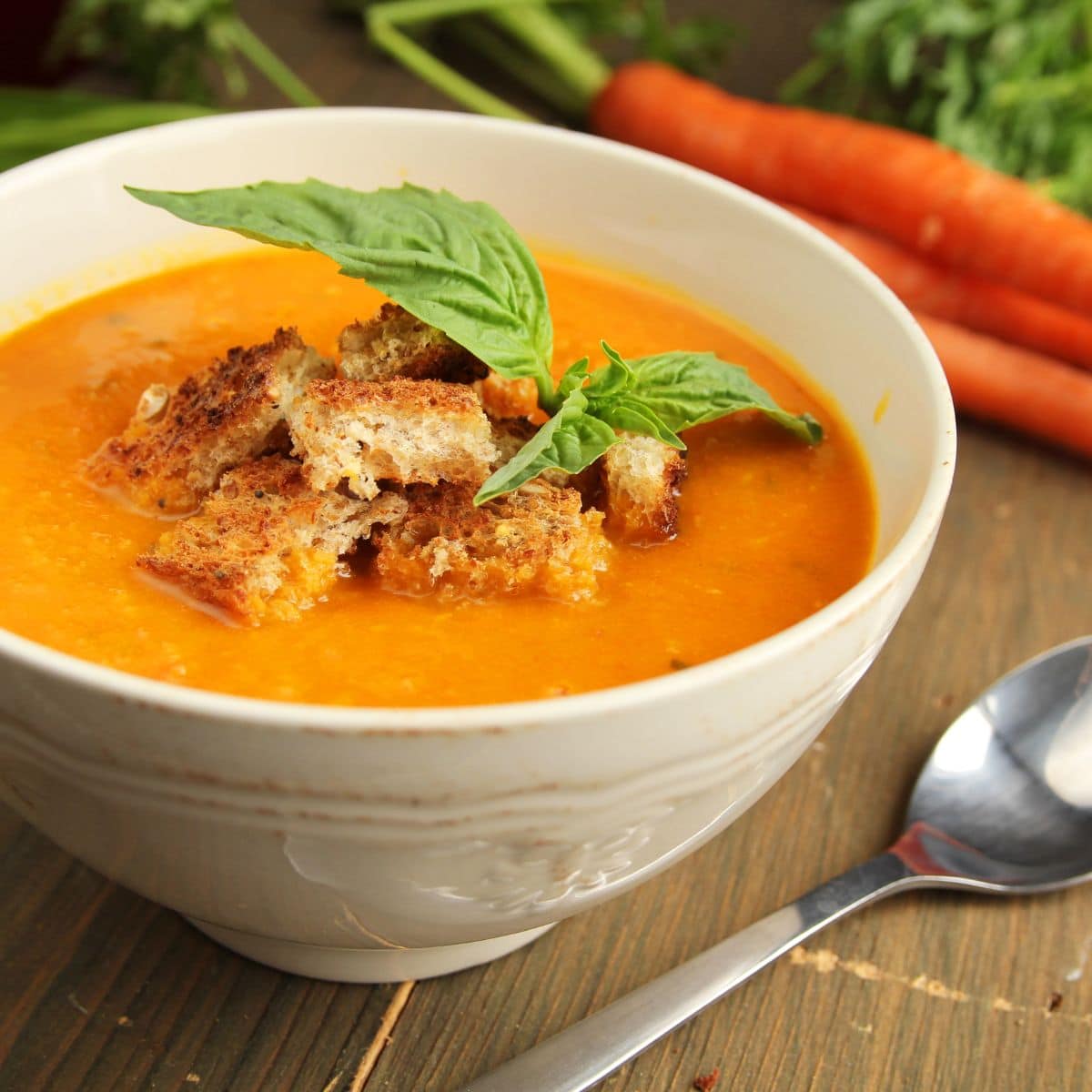
Jump to:
- Definition
- Why You Might Need A Soft Food Plan
- Types Of Foods Allowed In A Soft Diet
- Some Basics To Get You Started
- Benefits Of A Soft Diet
- Foods To Avoid On A Soft Diet
- Nutritional Requirements For Kidney Failure Patients
- Maintaining Adequate Protein Intake With A Soft Diet
- Tips For Preparing And Eating
- Appropriate Portion Size For A Soft Diet
- Common Mistakes To Avoid When Following A Soft Diet
- Fluid Restrictions And Alternatives For Kidney Failure Patients
- Long-Term Impact Of Following A Soft Diet
- Common Questions About A Soft Renal Diet
- A Soft Diet Can Be Your Ideal Diet - Without Being Hard on Yourself!
Definition
A soft diet is a type of eating plan that is recommended for people with certain medical conditions. It typically involves avoiding crunchy, hard-to-chew foods and sticking to more easier-to-digest meals. The purpose of this kind of diet is to protect the digestive system from being overworked or damaged due to illness.
So what does it mean to eat a soft diet? Generally speaking, it means choosing softer food items like cooked vegetables and fruits instead of raw ones; boiled eggs rather than fried; mashed potatoes instead of crispy French fries; and ground meats rather than steak cuts. In addition, you'll want to avoid any processed foods that may be difficult to break down in your stomach. Taking a moment to understand processed foods and CKD is important.
For those living with kidney failure, following a soft diet can help reduce pressure on their kidneys as well as minimize any discomfort associated with digestion issues.
By opting for gentler meal options, individuals can give their bodies time to rest and heal without feeling deprived or overwhelmed by mealtimes.
Why You Might Need A Soft Food Plan
For those who are living with kidney failure, dietary changes must be made in order to ensure proper nutritional requirements are met. However, it can be difficult to adjust to the new circumstances.
Typically, people with issues chewing and swallowing due to missing teeth or medical issues find a soft diet easier to consume. You can take a peek at these kidney diet meal prepping tips.
A soft diet may be recommended for people with kidney failure because it helps reduce strain on the kidneys by providing an appropriate amount of protein for the individual, less sodium, potassium, and phosphorus.
All of this, while still ensuring that they receive adequate amounts of nutrients such as carbohydrates, vitamins, minerals, and fats.
Following a soft diet requires discipline but also provides an opportunity for creativity when planning meals. It is important to focus on variety so that all nutritional needs are met without sacrificing flavor or enjoyment.
If done correctly, this type of diet can result in better health outcomes for individuals living with kidney failure. Achieving balance between taste and nutrition is essential for long-term success.
For More Recipes and Ideas --->> Get Your Free Meals and Recipes That Are Perfect for Pre-Dialysis Diets, Pre-Dialysis with Diabetes, or Dialysis Diets.
Types Of Foods Allowed In A Soft Diet
Fortunately for patients living with kidney failure, there are many delicious and nourishing foods that can be enjoyed while following a soft diet.
Kidney friendly soups and stews are a great option when it comes to eating a soft diet. Soups made with vegetables like carrots, celery, and potatoes offer plenty of nutrition without overloading your system.
Puréed vegetables such as cauliflower or squash also make excellent choices for those on a soft diet.
- Steamed fish provides essential fatty acids without too much fat intake, making it an ideal source of protein.
- Mashed potatoes provide carbohydrates in addition to being easy to chew and digest - simply use milk or a substitute for milk, instead of butter for added health benefits!
- Poached eggs are another nutritious choice; they're low in cholesterol yet high in protein and other essential vitamins and minerals. Can you eat eggs on a renal diet? Yes!
In choosing specific food items, always remember to consult your doctor beforehand to ensure it's safe for you specifically.
Eating healthy doesn't have to mean compromising taste or enjoyment either – there are countless ways to modify traditional recipes so that they fit within the guidelines set forth by your physician or nutritionist.
With some creativity and experimentation, anyone can enjoy a palate-pleasing meal while adhering to their special dietary needs.
Some Basics To Get You Started
Finding foods that are both soft and kidney-friendly can certainly seem daunting, but once you get started it is easier to understand what types of food you should eat. Here are a few basics:
Soups
Renal diet soup recipes are an easy go-to for most people on a soft foods diet, but may or may not be appropriate for everyone on a renal safe soft foods diet.
This is because people in the later stages of kidney disease may have to abide by fluid restrictions on top of their usual dietary restrictions.
However, if the patient does not have any fluid restrictions, soups are an excellent soft foods diet solution as long as the renal diet restrictions are followed.
A simple plan for making many soups is to simply puree some steamed or roasted vegetables with a cup of milk or water, heat, and add spices for taste.
Blending
Many foods can be blended down so they are better able to be eaten with a spoon or even a straw. You may need to add some liquid to whatever food you are blending to get a consistency that can be blended, so again fluid restrictions may come into play.
Some foods may need to be cooked a little extra to be able to be blended. Also, unless it is a flavor combination that is already known to be palatable for the patient, avoid blending too many foods together at once. Some flavors may taste overpowering when they are blended together.
Smoothies
The ultimate blended meal, almost everyone loves a smoothie. A typical kidney safe smoothie might include some low potassium food (like berries or peaches), whey protein powder if there are no protein restrictions, some ice cubes, and some water. There are tons of kidney friendly smoothies out there!
Depending on your restrictions, you might also add some yogurt or use milk instead of water. If you want to make it more like a shake, try adding ice cream if appropriate for the patient.
Mash
Most of the typical foods that come mashed are high potassium vegetables like potatoes, but there are a lot of other options that can be eaten on a kidney safe diet.
Cauliflower, for example, can pass for mashed potatoes when it is steamed and mashed. A low potassium diet for kidney disease is sometimes necessary.
Depending on how much potassium you can have, you also have the option to “leach” some of the potassium out of potatoes by double boiling them to make mashed potatoes.
Most vegetables can be cooked enough to be mashed down into a pureed state or you can purchase a jar of baby food in different flavors or use a baby food grinder to get the pureed consistency that you are looking for.
“Over” Cook
Many foods can be cooked down until they are soft enough for someone on a soft foods diet to handle. Fruits, vegetables, and even some meats will soften enough if you cook them a little extra and add some extra moisture. Again, do make sure you are paying attention to fluid restrictions when necessary.
Benefits Of A Soft Diet
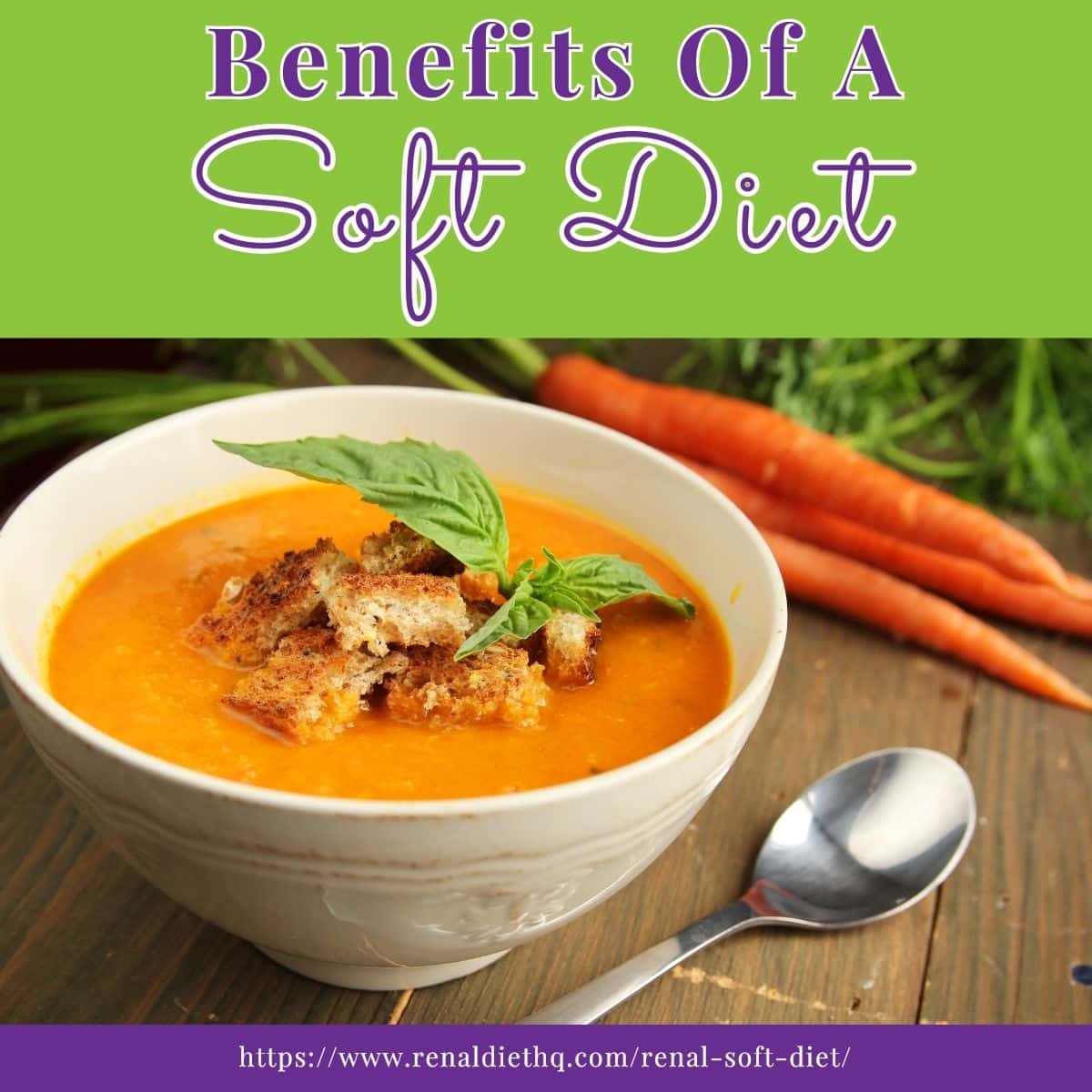
A soft diet provides many benefits to people with kidney disease progression towards failure. These include a lower sodium, potassium and protein intake that can help preserve renal function, especially for those who are not yet on dialysis.
By eating softer foods, individuals may experience fewer gastrointestinal problems such as nausea or indigestion. A mechanical soft food diet also helps reduce strain on the kidneys by limiting their work in breaking down food particles into smaller components for digestion.
In addition, a soft diet is often easier to swallow than other types of diets, which can be beneficial for those who have difficulty swallowing. Soft foods are less likely to irritate the esophagus or cause choking, creating a safer eating experience for those with limited digestive capabilities.
Eating soft foods can also improve gastrointestinal function since these items are much easier to chew and digest quickly compared to harder ones.
Soft diets provide numerous advantages for individuals living with kidney failure, from improved nutrition and gastrointestinal health to increased safety while eating.
As such, adhering to this type of diet is a great option for those struggling with chronic kidney disease or end-stage renal disease (ESRD). Pay attention to ESRD anemia, so that you can stay healthy all around.
You can get your needed fluid from a cup of water or a cup of milk depending on your other restrictions and eating healthy foods to boot. There are many water rich foods out there that you can consume.
Foods To Avoid On A Soft Diet
When following a soft diet for kidney failure, there are certain foods to avoid. Processed and fatty foods should be avoided because they can increase the risk of heart disease and stroke in those with kidney issues.
Foods that contain high levels of sodium also contribute to swelling caused by water retention, so avoiding them is important.
Dairy products (cheese kidney disease) may be difficult to digest due to decreased kidney function, so it's best to limit their consumption but consider non-dairy options that are great for renal diet milk and plant based which can be great substitutes for milk or dairy foods.
Finally, high-fiber foods like whole grains and legumes should also be limited since fiber can interfere with the absorption of nutrients from other food sources.
In addition to limiting these types of food on a soft diet for kidney failure, individuals should also pay attention to portion size when eating meals or snacks throughout the day.
Eating smaller portions more frequently helps keep blood sugar levels stable while reducing the amount of work required of kidneys during digestion.
To ensure success on a soft diet for kidney failure, it’s important that processed and fatty foods are eliminated (or consumed in moderation), sodium intake is reduced, and dairy products are kept at a minimum.
Monitoring portion sizes and fluid intake will help control symptoms associated with renal insufficiency while promoting overall health and wellbeing.
Nutritional Requirements For Kidney Failure Patients
Understanding nutritional requirements for kidney failure patients on a soft diet can help them take control of their health and improve quality of life.
The first step in managing nutrition for chronic renal disease is understanding what foods are safe to eat as part of a soft diet guideline. Protein intake needs will vary depending on individual factors such as age, medical history, and current stage of CKD.
For those not yet on dialysis, protein intake (and other dietary changes by stage of chronic kidney disease) should be adequate to meet the body's needs. Protein needs vary based on age, sex, and activity level, but the general recommendation is 0.8 g of protein per kg of body weight per day.
For those on a pre-dialysis diet protein needs may be lower because high protein levels can increase pressure in the kidneys. This may put more strain on them which can lead to progression of CKD.
The general recommendation is modest restriction to 0.6-0.8g of protein per kg of body weight per day. For those on maintenance dialysis, the recommended protein intake is 1.0-1.2 g of protein per kg of body weight per day.
It is important to note that for those who are on dialysis, the protein needs may be higher since the procedure itself can cause protein losses and inflammation, but these should be still determined on an individual basis.
Generally, CKD patients who want to try the soft diet should still adhere to the renal diet. A renal diet focuses on foods that are safe for chronic kidney disease. As kidneys fail, they are less able to process out excess waste and materials. There are many benefits of a renal diet.
The buildup of certain materials in the blood can lead to very serious problems. Three of the most common restrictions on a renal diet are sodium, potassium, and phosphorus.
Sodium
Excess sodium in the blood can cause moderate to severe swelling (also called edema), shortness of breath, and heart failure among other dangerous health issues.
Sodium is typically the very first food restriction for anyone on a renal diet. Be careful that when you are making adjustments to lower the sodium in the meal, don't use a salt substitute because it will contain extra potassium which would not be good for people with kidney disease.
Phosphorus
Phosphorus is a mineral that is found in a lot of healthy foods, but can build up in your system and cause hardening of tissues, brittle bones, and many other painful conditions.
While phosphorus is found in many healthy foods, it tends to be a lot more prevalent in canned, bottled, and processed foods because it is used as an additive, so pay attention to low phosphorus foods.
Potassium
Potassium is another typically healthy mineral that helps build and control muscles and nerves, maintains pH and electrolyte levels, and also helps keep your heart at a healthy rhythm.
High potassium blood levels can lead to weakness, nausea, numbness, and irregular heartbeat. Watch out for high potassium foods if you have elevated blood levels and are following a low potassium diet.
Each of these typical renal diet food restrictions will likely have varying levels of restrictiveness depending on the patient and the stage of kidney failure.
Often in the beginning stages of renal disease, phosphorus and potassium are not major restrictions, but they become more important in the later stages of the disease. You want to maintain healthy kidneys as long as possible.
Additionally, maintaining adequate hydration while avoiding too much fluid intake is essential; if needed, alternative sources like gelatin or popsicles may be used instead of drinking water directly.
Eating Balanced Meals
Finally, it's critical to remember that eating balanced meals should also be a priority on any type of restricted diet - including soft diets specifically designed for individuals with kidney problems.
Eating fruits and vegetables that are low in potassium but high in vitamins and minerals helps provide important nutrients necessary for proper bodily function and overall well-being. There is a low-potassium diet for kidney disease.
Ultimately, by carefully balancing the right kinds of food into one's daily meal plan tailored according to individual needs, people living with chronic conditions like kidney failure can begin taking steps towards improving their health without compromising taste or enjoyment!
Maintaining Adequate Protein Intake With A Soft Diet
Protein intake can be difficult when following a soft diet because of the food restrictions that come along with it.
As previously mentioned, there is a difference in the protein requirement for CKD patients who are not yet on dialysis and those who are maintained on it.
Fortunately, adhering to a soft diet still provides many ways to get proper amounts of protein while still adhering to the dietary needs in kidney failure.
This table outlines some alternatives to traditional sources of protein as well as their nutritional information:
| Food Item | Calories (kcal) | Protein (g) |
|---|---|---|
| Tofu | 76 kcal/100 g | 8.1 g/100 g |
| Tempeh | 192 kcal/100 g | 19 g/100 g |
| Nut Butters | 607 kcal/100 g | 25 g/100 g |
| Seitan (Wheat Gluten) | 125 kcal / 28g serving size | 21 g /28g serving size |
In addition to these alternative proteins, incorporating high-protein foods into meals such as oatmeal or smoothies is another way to boost overall protein intake, depending on your individualized requirement.
For example, adding peanut butter or Greek yogurt to oatmeal increases the amount of protein without changing the texture too much.
If desired, plant-based milk like almond milk and cashew milk provide an additional source of both flavor and nutrition. Other milks, like oat milk can be good for kidney disease.
Smoothies
Smoothies for kidney disease also offer an easy way to sneak in extra nutrients like fruits, vegetables, nuts, and seeds that may not otherwise fit into a meal plan due to its soft consistency requirements.
Eggs
Can you eat eggs on a renal diet? One great source of protein on a soft diet is egg whites. Egg whites contain all nine essential amino acids, making them one of the most complete proteins available.
They also have very little fat and cholesterol, making them ideal for people with kidney problems or other health issues requiring a lower-fat diet.
Additionally, eggs pack plenty of vitamins and minerals such as vitamin B12, selenium, phosphorus, and zinc - all necessary nutrients for maintaining good kidney health. You can cook them in a little olive oil and still have a healthy meal.
Here are some ideas for incorporating protein into your food plan:
- Add scrambled egg whites to oatmeal or toast in the morning.
- Top salads with grilled salmon or tuna.
- Enjoy a bowl of chili made with beef mince, beans, and vegetables.
- Make veggie fritters using mashed potatoes mixed with grated zucchini/carrot/onion & fried until golden brown.
- Enjoy a baked potato topped with cottage cheese and steamed vegetables.
- Add non-fat dried milk powder to puddings and soups if you need to increase protein
With a few simple substitutions and additions, the right protein intake on a soft diet is achievable.
By getting creative in the kitchen and experimenting with different flavors, anyone with kidney failure can meet their daily protein goals for optimal wellbeing!
Tips For Preparing And Eating
Preparing and eating soft meals can be a challenge for those with kidney failure, but there are several tips that can help make the process easier.
From choosing the right ingredients to knowing how best to prepare them, these strategies will ensure that you get all the necessary nutrients in every meal.
Here are four tips for preparing and eating soft meals:
- Choose Kidney Friendly Ingredients: When selecting your ingredients, look for foods that are low in sodium, potassium, and phosphorus, and ensure proper amounts of protein depending on your needs. Make sure to read food labels carefully before purchasing any food products as some may contain hidden sources of sodium or other nutrients that should otherwise be restricted.
- Incorporate Soft Food Recipes: There are plenty of delicious recipes out there that utilize soft food ingredients like mashed potatoes, oatmeal or pureed vegetables - making it easy to create nutritious meals without sacrificing flavor. Look online for inspiration on ways to combine these items into tasty dishes! You can use a jar of baby food or use a food processor to puree foods into the appropriate consistency.
- Plan Ahead For Meals: Meal planning is key when it comes to following a healthy diet with kidney failure – especially if you’re on a limited budget or have difficulty getting around town due to health issues. Try writing up a weekly menu ahead of time so you know exactly what needs to be purchased and prepared each week; this will also prevent unnecessary snacking or overeating which can lead to weight gain over time. Try this 7 day meal plan for kidney disease.
- Eat Slowly And Mindfully: Last, but not least, remember to take your time while eating by savoring each bite and chewing thoroughly - this helps aid digestion and allows more time for the body’s natural satiety signals (the feeling of fullness) to kick in before finishing off an entire plateful of food at once! Eating slowly also helps maintain proper nutrition levels since larger portions tend to decrease overall nutrient intake from individual meals over time. Read more mindful eating tips for a renal diet.
These simple tips can help make preparing and eating soft meals simpler for individuals living with kidney failure – allowing them access to more variety and better nutrition than ever before!
Whether cooking at home or dining out with friends, being mindful about what goes into one's plate is essential for both physical and mental wellbeing.
This is going to lead towards greater quality-of-life despite having chronic illness conditions such as renal disease. Need more tips for eating a pre-dialysis diet?
Appropriate Portion Size For A Soft Diet
When it comes to portion size for a soft diet, kidney failure patients need to pay attention to the appropriate amount, (Great podcast listen)!
The diet guidelines recommend that people with this condition should eat no more than 1-3 cups of food per meal. This is because their bodies can only handle so much at once and too much food can be harmful.
It’s important for them to stick to these limits in order to make sure they are getting the nutrients they need without overburdening their kidneys.
Meals should also include foods from all five major food groups: grains, fruits, vegetables, dairy products, and proteins.
Each food group has different recommended portion sizes depending on age and gender so it’s best for individuals to consult a nutritionist or doctor for personalized advice.
Additionally, some foods such as potatoes may contain high levels of potassium which could be dangerous if eaten in large quantities by someone with kidney failure. Have you considered sweet potatoes and kidney disease?!
Ultimately, understanding how much each person should eat during meals while adhering to a soft diet can help those with kidney disease stay healthy and live longer lives.
Knowing what types of foods are allowed, and the right portions will ensure that an individual receives adequate nutrition without risking further damage to their kidneys.
Common Mistakes To Avoid When Following A Soft Diet
Continuing on from the previous section, understanding proper portion size when following a soft diet is essential to managing kidney failure.
However, there are additional mistakes that should be avoided as well in order to ensure successful dietary management of this condition.
| Mistakes | Foods To Avoid | Alternatives |
| Not avoiding processed foods | Processed meats | Freshly cooked lean meats |
| Not avoiding salty foods | Salty snacks | Unsalted nuts and seeds |
| Not reducing sugar intake | Sweets and desserts | Low calorie sweeteners |
| Not avoiding dairy products | Milk and cheese | Plant based alternative milk products |
These common mistakes can lead to negative health outcomes if not managed correctly.
Fortunately, there are many alternatives available for each of these food groups that still provide necessary nutrients without causing any harm.
For example, instead of processed meats, one could opt for...
- Freshly cooked lean meats with little sodium added. Check into low phosphorus meats.
- Unsalted nuts and seeds make great replacements for salty snack options
- Low calorie sweeteners can replace traditional sweets and desserts.
- Finally, plant-based milk options like almond milk offer a healthier way of getting needed vitamins than cow’s milk does.
Following these suggestions will help maintain balanced nutrition while adhering to the restrictions of a soft diet for those suffering from kidney failure.
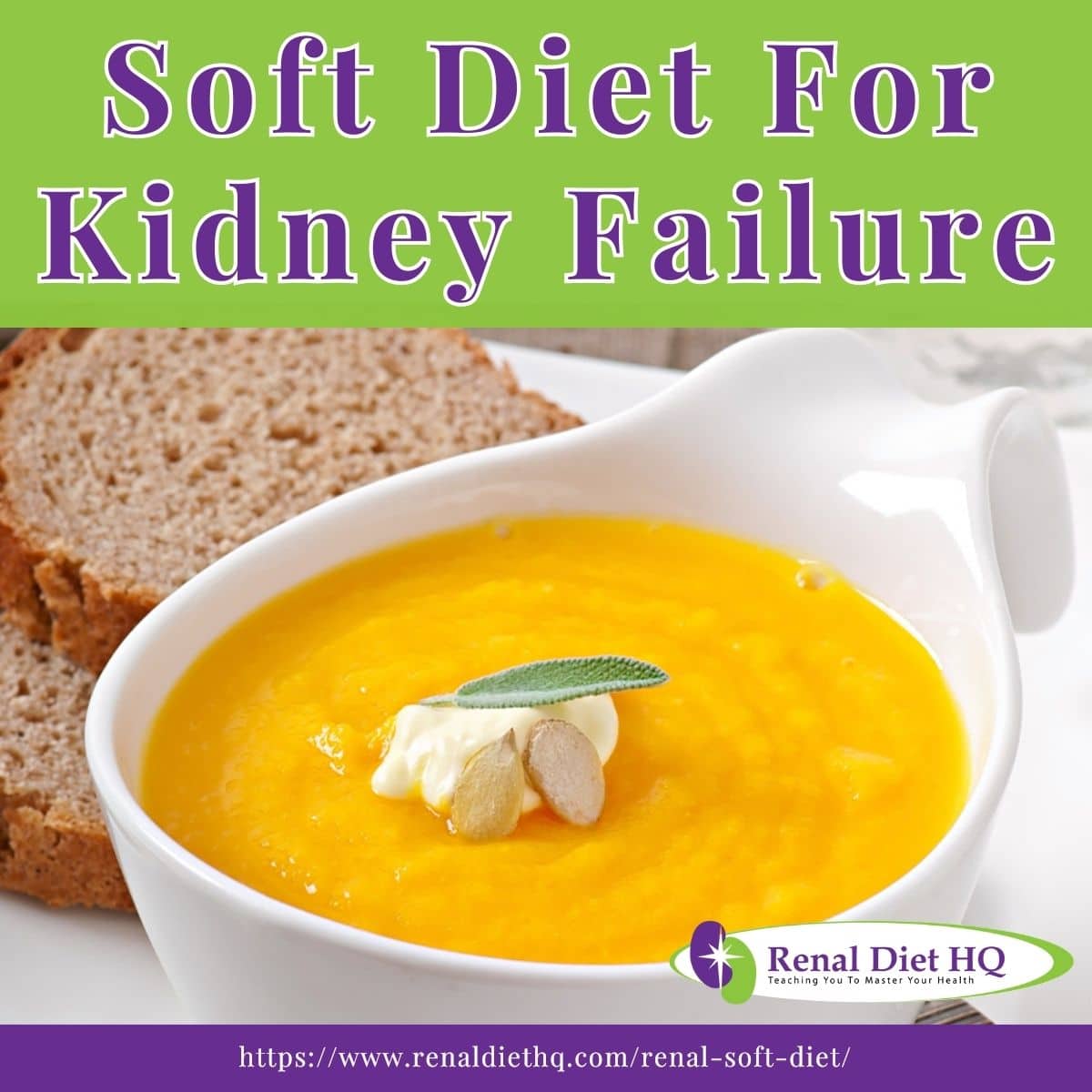
Fluid Restrictions And Alternatives For Kidney Failure Patients
Fluid restrictions are a key component of the diet for kidney failure patients. When struggling with this condition, it's important to carefully monitor and limit your fluid intake in order to prevent further damage to the kidneys or other organs.
The amount of fluid allowed each day is typically limited to around 48 ounces per day. You can follow this fluid restricted diet menu.
In addition to limiting fluids, it’s also beneficial to select alternative liquids that contain fewer calories and are low in sodium.
Examples include unsweetened tea, caffeinated coffee (in moderation), sugar-free milk drinks, vegetable juice cocktails, fruit juices like orange juice, and water.
These alternatives can help reduce overall fluid intake while still providing essential nutrients like calcium and vitamins A & B12.
With careful monitoring of both their liquid and food intake, individuals living with kidney failure can maintain a balanced diet that will support their health needs long-term.
Long-Term Impact Of Following A Soft Diet
Following a soft diet for kidney failure has long-term effects, both positive and negative. It's important to understand the impacts of making dietary changes in order to ensure that they are beneficial overall. You can avoid kidney failure with dietary changes.
The primary benefit of following a soft diet is improved nutritional status which can affect an individual’s overall health and well-being.
When an individual follows a diet specifically tailored to their condition, it can also help reduce strain on their kidneys, which can potentially reduce the risk of disease progression.
Additionally, following a soft diet may also lower blood pressure (which helps your blood vessels stay healthy) and improve cholesterol levels by reducing the amount of sodium and fat consumed.
On the other hand, there can be some drawbacks associated with this type of dietary change as well.
- For example, if someone is not getting enough protein from their food sources due to restricted eating options, then this could lead to muscle loss over time and cause fatigue.
- If an individual does not consume enough calories through their foods or fluids, then this could potentially lead to malnutrition or weight loss.
- It's essential for those who follow special diets to receive adequate nutrition education so that these potential problems can be prevented or managed properly.
Overall, sticking to a kidney-failure specific soft diet comes with many benefits but should always be done under doctor supervision so that any potential risks can be avoided.
With consistent monitoring and guidance from medical professionals, individuals who suffer from kidney disease can ensure that they remain healthy while still receiving all the necessary nutrients needed for daily functioning.
Short-Term Benefits Of Following A Soft Diet
When it comes to diets, one of the most important aspects is understanding what benefits can be gained from following a certain plan. When considering a soft diet for overall health and wellbeing, there are many short-term benefits that should not be overlooked.
These range from improved nutrition, appropriate protein intake and the ability to incorporate additional dietary supplements into meals.
The primary benefit of a soft diet is that it may provide better nutrition than other types of diets. Moreover, since they often require minimal preparation time, they’re great for busy individuals who don't have much free time on their hands. Meal prep for a kidney disease patient does get easier over time.
In addition to providing better nutrition than other diets, eating soft meals has numerous other benefits including increased availability of protein sources and easier incorporation of nutritional supplements into one's daily routine.
Both essential components in achieving optimal health outcomes no matter what stage of life you're at!
Common Questions About A Soft Renal Diet
Frequency matters when it comes to following a soft diet. Eating the right kinds of meals and snacks at regular intervals is key for managing kidney failure, as well as maintaining optimal health. But how often should one be eating their soft meals?
A good starting point for determining an individual's own personal soft meal frequency is to create a schedule that works best with their lifestyle.
A typical plan might involve three main meals per day - breakfast, lunch and dinner - with two or three smaller snacks in between. Check out this 7 day renal diet meal plan to get an idea of what a renal diet looks like!
Of course, this can vary depending on each person’s needs and preferences; certain medical conditions may require different amounts of food or more frequent snacking throughout the day.
It’s important to remember that everyone’s dietary needs are unique which means that finding the perfect balance between what you need nutritionally and what feels comfortable in terms of meal frequency will take time.
With patience and careful consideration regarding food choices, however, anyone dealing with renal issues can achieve success in creating a nutritious yet gentle soft meal schedule that meets both their physical and emotional needs.
When considering what foods to include in a soft diet, it is important to choose nutritious options that will provide the body with necessary nutrients. There are many delicious and healthy choices available for those who are following a soft meal plan.
Mashed potatoes, soft fruits, soft vegetables, pudding desserts, and creamy soups can all be excellent additions to any meal. Hot cereals like cream of wheat are great with butter and some sugar for flavor. For a bonus, check out low potassium cereals.
Mashed potatoes make an ideal side or main dish when on a soft diet. They are easy to chew and digest while providing essential vitamins and minerals such as calcium, phosphorus, potassium, zinc, and manganese.
Soft fruits like bananas and applesauce offer fiber along with natural sweetness, but you might want to avoid fresh fruit because it can be difficult to chew. Plus they can help satisfy cravings without causing discomfort due to their easily-digested texture.
Soft vegetables like cooked carrots, butternut squash, and winter squash also supply key nutrients including beta carotene and vitamin C which aid immunity and digestion - and delicious to add some calories try squash with maple syrup.
Additionally, pudding desserts often made from low fat milk or yogurt can serve as both an enjoyable treat as well as an additional source of protein and calcium.
Finally creamy soups provide hydration plus flavor while being gentle on the digestive system making them another great option for those looking for tasty yet nutritiously balanced meals during this time of dietary transition.
However, remember that these should be consumed in proper amounts based on your individual needs.
Overall, incorporating these nutrient-rich items into your daily routine will ensure you’re getting the nourishment you need to stay healthy throughout your journey – no matter how long it lasts!
When it comes to dietary supplements for those on a soft diet, there are many options available, which depend on your personalized needs.
For people with kidney failure, the right mix of nutrition supplements can help support overall health and wellbeing. In this section, we'll look at some important things to consider when selecting the best kidney health supplements while following a soft diet.
First off, let's discuss what types of dietary supplements may be beneficial during a soft kidney diet:
Vitamin Supplements: Vitamins such as B6, B12, C and D3 can help improve your energy levels and strengthen your immune system.
Mineral Supplements: Minerals like magnesium and potassium can help regulate blood pressure and provide essential nutrients that may be lacking in a traditional soft diet plan.
Protein Supplements: A high-quality protein supplement can provide an additional source of energy and muscle building blocks throughout the day.
Herbal Supplements: Herbs like turmeric, ginger, and garlic have anti-inflammatory properties which may reduce pain caused by poor kidney function or other conditions related to kidney failure.
It is also important to consult with a healthcare professional or renal dietitian before taking any type of supplement since the type and amount of supplement you’ll need also depends on your current stage of CKD. Yes, there are Diet Changes by Stage of Chronic Kidney Disease!
Your doctor will be able to recommend the best products based on your specific needs and lifestyle habits. Furthermore, they can advise you on how much of each supplement should be taken daily in order to achieve optimal results without overdoing it or causing harm to your body.
Once you've chosen the correct nutritional supplements for your individual needs, make sure that you follow all instructions closely so that you get the most out of them without putting yourself at risk for adverse side effects or further complications due to improper use.
Eating healthy and staying active are still key components for maintaining good health, which cannot be replaced by supplements.
A Soft Diet Can Be Your Ideal Diet - Without Being Hard on Yourself!
In conclusion, following a soft diet for kidney failure can be beneficial in the short-term and provide adequate nutrition when planned carefully.
Eating softer foods more frequently throughout the day can help ensure that you get enough protein and other nutrients while avoiding difficult-to-digest items like bran cereal.
In addition, there may also be certain supplements that could benefit your overall health while on this type of dietary plan.
Eating a soft kidney diet might sound like an easy thing to do, but it's actually not so simple. It requires careful planning to make sure you are getting all the necessary vitamins and minerals, as well as enough protein each day.
To maximize its benefits, it is important to be properly guided by a professional such as your physician and nutritionist!
Although following a soft diet takes some dedication, with proper meal planning and supplementing where needed, you can still enjoy delicious meals without having to worry about taxing your kidneys too much. By doing so you’ll feel better both physically and mentally - something worth striving for!

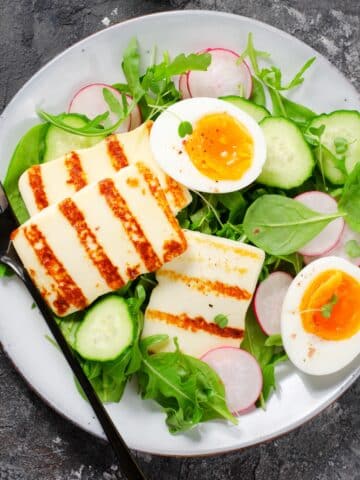


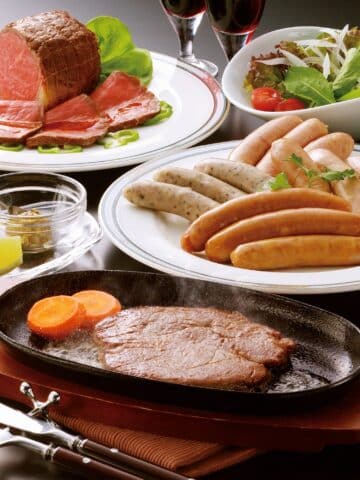

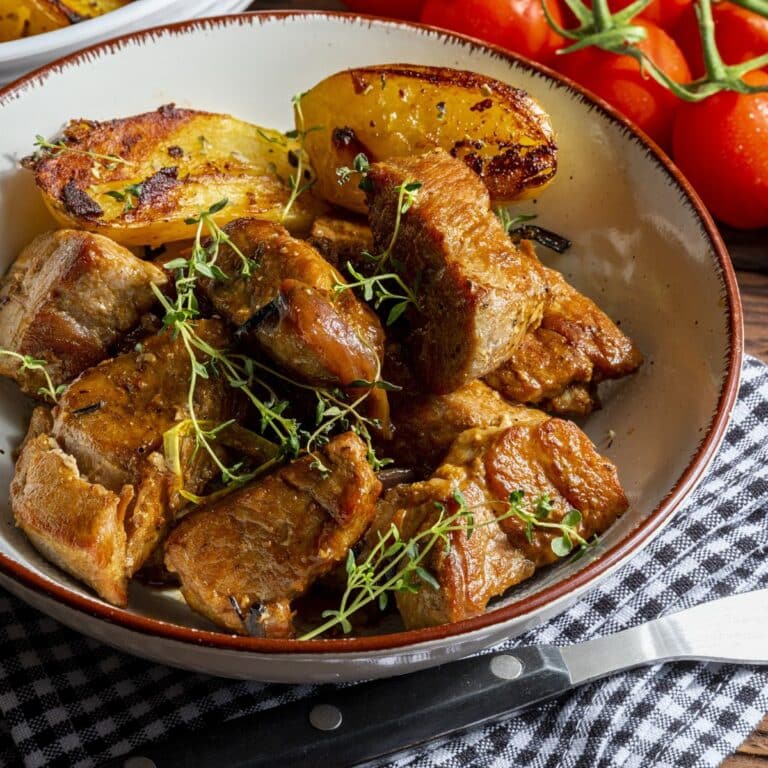
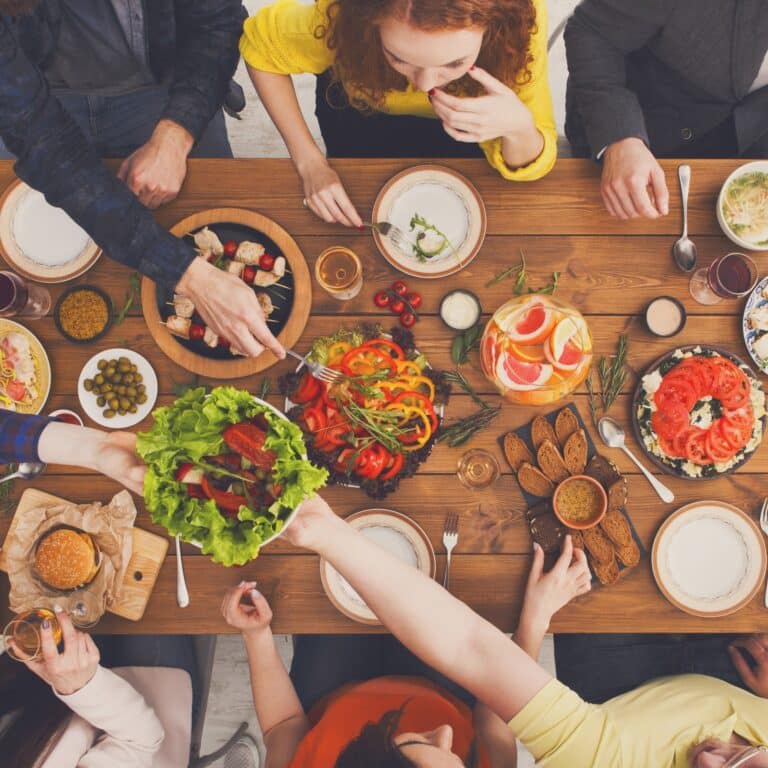
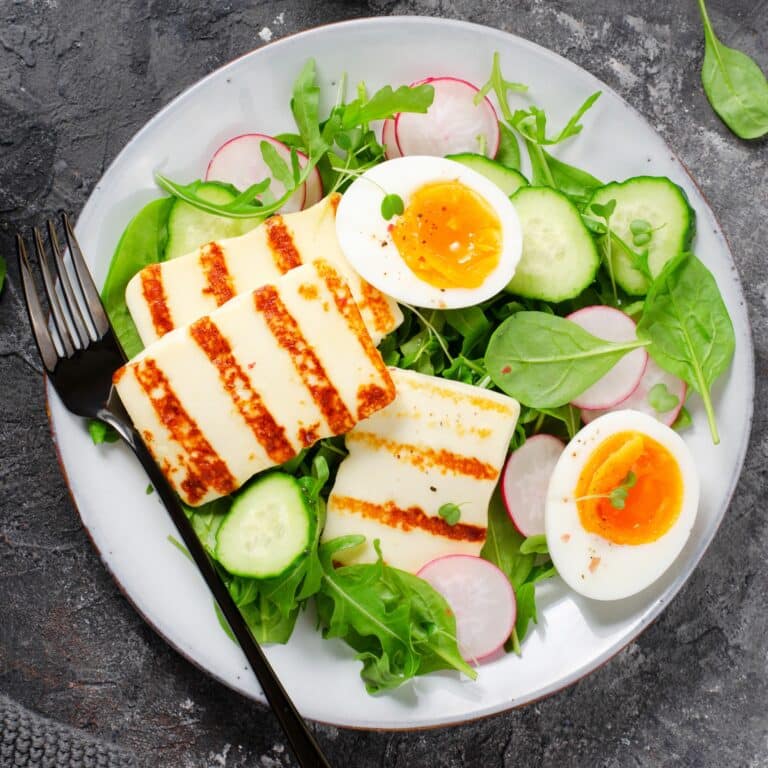
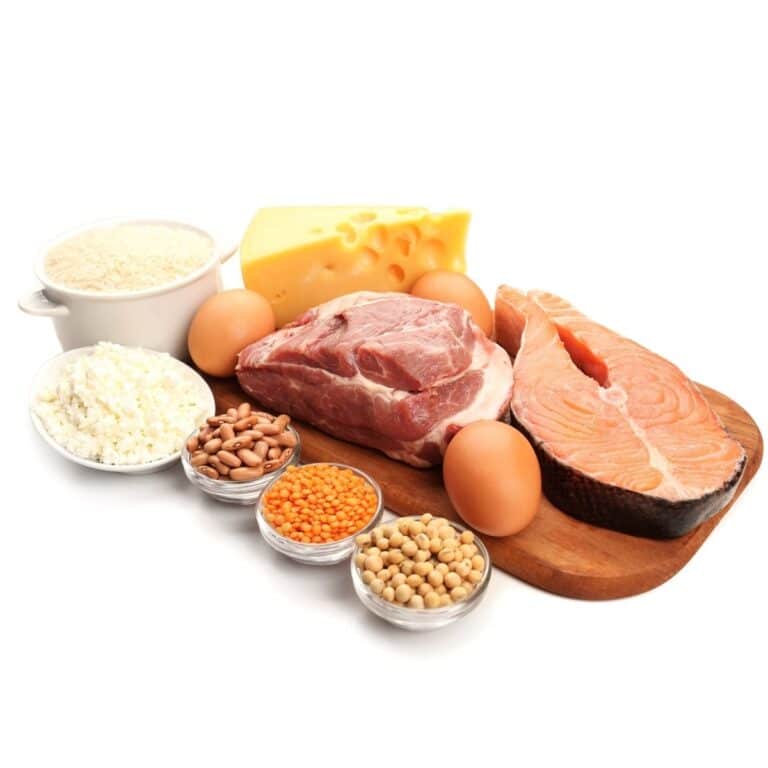



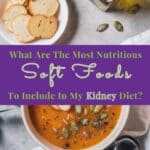
I am a ckd patient. stage4.I am from Bangladesh. According to my country give a diet advice.